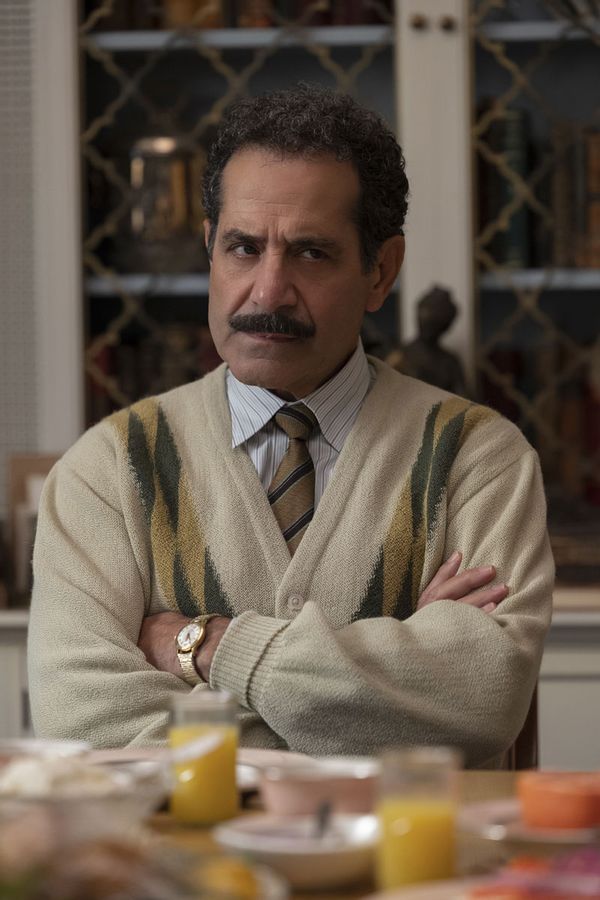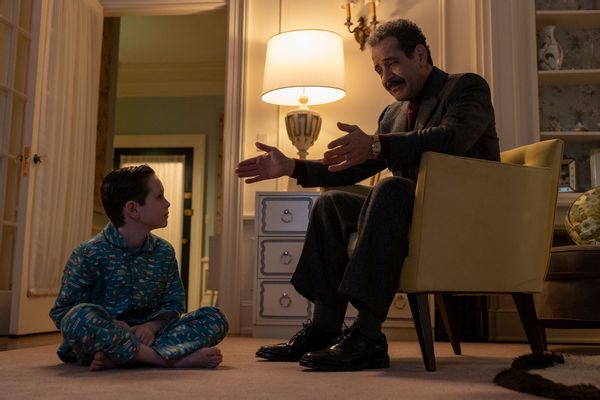
It was so jarring, I double-checked the screener. Had they sent the wrong one, the wrong show even? It was the final season of "The Marvelous Mrs. Maisel," and the fifth episode opened with entirely different characters. Or rather: a familiar character grown up. So grown up, she was unrecognizable.
An early criticism of "Mrs. Maisel," about a mother and housewife turned aspiring comic in 1950s and '60s New York, was that the children of the main character weren't around very much. Neither were the child care problems that likely would have plagued the soon-to-be divorced mother of two. Those children are Ethan and Esther, the latter of whom started the show as a mere baby.
But in a flash-forward through time in the final season, Esther (Alexandra Socha, in an excellent and uncanny performance) is grown, extremely anxious and incredibly smart. A genius, in fact — who NASA keeps unsuccessfully recruiting — studying for her PhD and making a breakthrough in DNA sequencing. How did Esther get there?
The idea that smart people can't be at the happy table is beyond Abe.
If you ask her grandfather, Tony Shalhoub's Abe, it has a lot to do with him. Feminism has come to "Mrs. Maisel." Dad feminism, that is. It's come before, inconsistently, anachronistically and tilting heavily toward white feminism. As Marie Claire wrote, "You are not a feminist hero simply for following your dreams. You are not a feminist hero if you're only actively fighting for your own place." We only have one episode left in the series, and intersectionality is not going to hit the characters like a lightning bolt, nor would it make sense exactly in the context of the time period. Midge is not going to apologize. For anything.
But in the episode "The Princess and the Pea," Abe has a recent revelation deepen: that the female children in his life are just as deserving of education, attention and hope as the male. In believing himself to be largely responsible for their success or failure, though, he's just furthering more ideas of the patriarchy.
In the previous episode, the long-running, unfortunate joke of Ethan not being very bright deepened. Due to scheduling conflicts, Abe had to be the one to attend open house at the boy's school, where the proud grandfather discovered all the children have been grouped into sections based on interests in math, writing, science. His grandson Ethan is at the "happy" table. Because Ethan? He's just really happy.

Abe falls into the trap of a long line of fatherly men who think they know best.
But for Ethan, who delightedly makes chicken sounds as he leaves an apartment, it appears not to be coming, at least not in the way that Abe finds suitable. The idea that smart people can't be at the happy table — or that there are many different kinds of intelligence — is beyond Abe. But the older, occasionally obstinate man does show a flash of change, an insight, when he stumbles upon his granddaughter playing the piano, unprompted and at a prodigy level.

One way he does stretch beyond his time and experience? He talks to other men about his feelings, and he specifically admits responsibility for not teaching his daughter Midge (Rachel Brosnahan) or even giving her a chance. When he tells the men – all thinkers and learners and old and white, gathered for a nice, fancy, manly dinner – about his daughter's divorce, he sounds in awe of her resilence: "Instead of collapsing from the weight, she emerged stronger . . . now I think perhaps that was who she was all along. I never really took her seriously." Abe talks of taking his son to Columbia University weekly, so that the boy could think about his future, all the possibilities open to him, which Abe did not do with Midge; it "never occurred" to him to take his daughter. "What could she have been if I had helped her and not ignored her?"
Perhaps Esther is an example of that.
Abe is not able to change the other men. They look away from him, down at their menus. They order quickly. They don't want to discuss his insistence that "us men . . . caused a lot of harm. We control so much." Abe's reckoning and his influence only extend so far.
But he does change himself. We have evidence of that in the glimpses of the future "Mrs. Maisel" shows us. Esther and her grandfather stay close. He's the only person she can really talk to, she says in the flash-forward when she's in her 20s and making major scientific breakthroughs. It's good to know that Abe will be around for a while, even beyond the life of the show, and it's good to know the reversal of his ways, those ways he was set in for so long, did make a difference in the universe.







